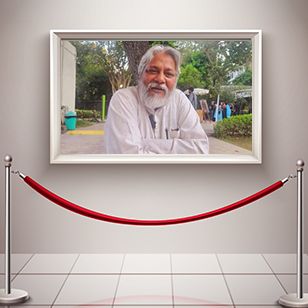
CEO Insights Hall of Fame: 8 Legends Who Keep India Evergreen

Dr. Rajendra Singh: The Waterman of India

Known as the "Waterman of India," Rajendra Rajendra is a well-known environmentalist and water conservator who has devoted his life to restoring rural Rajasthan, India's water resources.
Born in Uttar Pradesh's Meerut, Rajendra began working for the Education Department in Jaipur, Rajasthan, in 1980. He is also a qualified practitioner of Ayurvedic medicine. In Jaipur, he also began working with Tarun Bharat Sangha, an NGO comprised of university officers and students.
Left His Job to Improve the Livelihood of Rural People
After learning about the hardships faced by the rural Rajasthani people while working for TBS, Rajendra made the decision to quit his government position in 1984 in order to improve their lot in life. He was appointed TBS's general secretary in 1985, and he is still the organization's chairman today. Rajendra saw how water constraint was impacting the life of the Alwar villagers during his interactions with them.
He had a strong concern for the environment and a strong desire to address the water situation as a result of these encounters. Following his graduation, he started collaborating with grassroots groups and regional NGOs to introduce sustainable water management practices in his native state. Reviving the Ruparel River in Rajasthan is one of Rajendra's most noteworthy accomplishments.
Revival of the Ruparel River
Once a significant supply of water for the region, the Ruparel had been drastically reduced as a result of years of overexploitation and poor management. Rajendra and his group put forth a lot of effort to revitalize the river by rehabilitating the catchment area's ancient water harvesting structures, such as "johads" (traditional earthen dams) and "kunds" (water tanks). They were able to revitalize the river and raise the water table through these efforts, which gave the nearby settlements fresh life.
One way that Rajendra Rajendra has been promoting the use of indigenous and traditional knowledge systems for water management is through the planting of trees.
He and his group came to the conclusion that the region's water supplies were being depleted as a result of deforestation and excessive usage of natural resources. In order to improve the soil's ability to retain water, they started planting trees in the catchment areas of water sources like ponds and rivers.
Found Borewells Negatively Affecting Groundwater Levels
He discovered early on that borewells were negatively affecting the water cycle. Groundwater levels decreased when residents began relying more and more on bore wells to irrigate their property rather than the traditional johad, which collected rainfall and then replenished the water table.
Restored Johads
With the help of several villagers, Rajendra was able to restore a johad in Gopalpura that had virtually dried up from neglect after conducting some research on these concave structures that collect and retain water throughout the year. Since then, Rajendra and TBS have been able to bring back about 3000 johads, which are dispersed throughout approximately 650 communities in the Alwar district.
The Indian waterman has received accolades for his efforts all around the world, including the 2015 Stockholm Water Prize, also referred to as "the Nobel Prize for water," and the 2001 Ramon Magsaysay Award for Community Leadership, to mention a couple.